MXA RACE TEST: THE REAL TEST OF THE 2023 KAWASAKI KX450
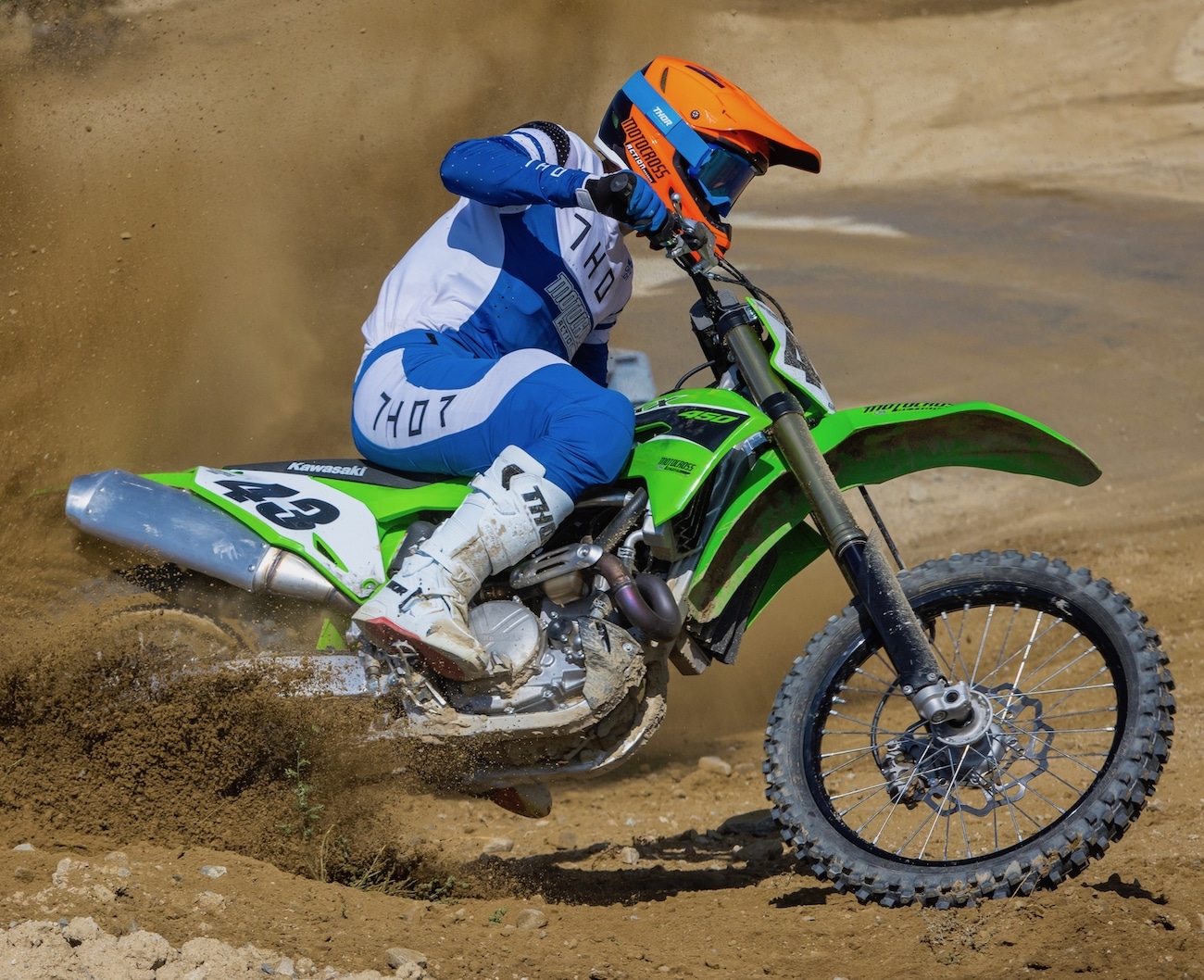
The 2023 KX450 is unchanged from the previous model, but, at $9599, we think it is a good buy. THE GEAR: Jersey: Thor MX Prime, Pants: Thor MX Prime, Helmet: Thor MX Reflex, Goggles: Thor MX Activate, Boots: Thor MX Radial.
Q: FIRST AND FOREMOST, IS THE 2023 KX450 BETTER THAN THE 2021–’22 KX450?
A: No, but that’s because apart from the radiator-wing graphics, the 2023 Kawasaki KX450 is the 2021 and 2022 KX450. This isn’t the only BNG bike on the showroom floor for 2023, but “BNG” is supposed to stand for “Bold New Graphics,” and the 2023 KX450 graphics are a far cry from bold.
Q: WHAT YOU NEED TO KNOW ABOUT THE 2023 KAWASAKI KX450 ENGINE.
A: Every bike has its personal peccadilloes. Here are the things we watch on the 2023 Kawasaki KX450 engine.
(1) Maps. The easiest way to change maps on the 2023 KX450 is to swap plug-in couplers. The green plug-in is the stock KX450 map, and it delivers the best all-around power. The black coupler mellows out the complete rev range and gives up 1 to 2 horsepower from 6000 rpm all the way to 11,500 rpm. The white plug-in is the aggressive coupler. It produces the exact same horsepower from bottom to top as the stock green coupler, but delivers the power with a crisper feel (and a little less over-rev).
(2) ECU mapping. Kawasaki does offer a $700 mapping tool that allows riders to access 10 pre-programmed Kawasaki maps (three of which mimic the green, white and black couplers). It allows the owner to create his own maps. We don’t see the point of paying $700 to change the mapping yourself when you can send the black box to Twisted Development to have them put special maps in for you. Yes, you have to pay for the service, but it isn’t $700.
(3) Clutch. The 2021–2023 KX450 clutch has a large, 146mm clutch basket, which allows for 7mm-larger clutch plates. Kawasaki got rid of its horrid judder spring system and replaced it with a full-size eighth plate. And, finally, Kawasaki replaced the five individual coil-type clutch springs with a large-diameter Belleville washer. Unlike with five separate coil springs, the larger Belleville washer applies pressure to the clutch pack evenly around its circumference.
(4) Clutch plates. The 2023 KX450 clutch now uses three different clutch-plate part numbers. The outer and inner fiber plates are different from the six middle plates. This does make clutch changes unnecessarily complex.
(5) Launch control. The KX450’s Launch Control button retards the ignition timing above 7000 rpm to knock off as much as 4 horsepower, which helps riders maximize traction off the gate. When activated, the indicator light next to the button flashes to let the rider know the system is engaged. The system automatically disengages when the transmission is shifted into third gear, switching it back to the chosen ignition map.
(6) Overheating. We run a 2.0 kg/cm2 Twin Air Ice Flow radiator cap to keep the radiator from spewing fluid.
(7) Neutral. To get the KX450 into neutral on the starting line, we had to rev the engine and snick the shift lever at max rpm. Paradoxically, every MXA test rider appreciates a bike that has a hard-to-find neutral when he is grabbing gears on the face of jumps.
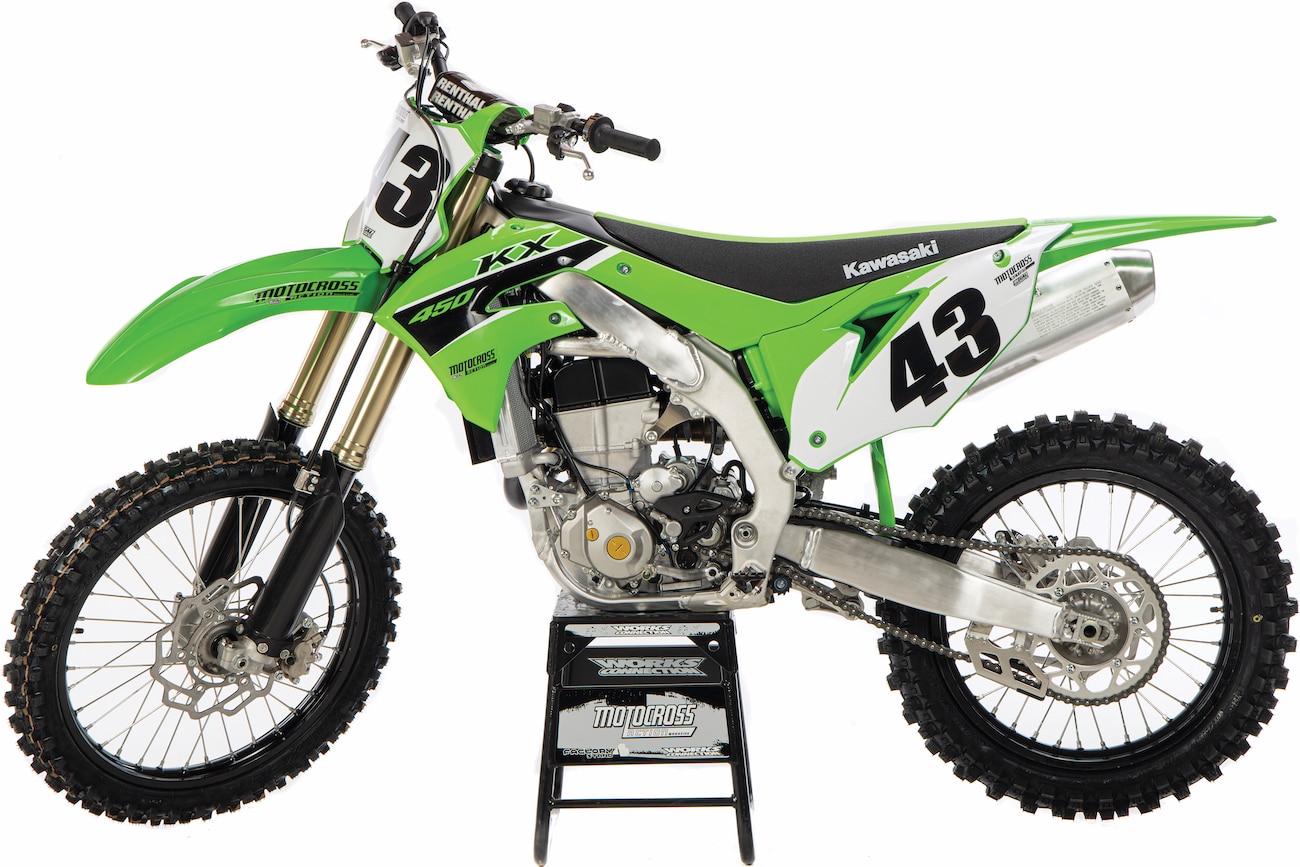
Nothing about the 2023 KX450 stands out. Its goodness comes from its pleasant powerband and solid handling.
Q: WHAT YOU NEED TO KNOW ABOUT THE 2023 KAWASAKI KX450 CHASSIS.
A: Every bike has its own personal peccadilloes. Here are the things we watch on the 2023 Kawasaki KX450 chassis.
(1) Handlebars. Kawasaki’s marshmallow-like bar-mount inserts twist and deform in the smallest crashes. We replace them with stiffer, aftermarket, rubbber-mounted inserts.
(2) Rear brake rotor. Riddle us this: The 2023 KX450 has an enormous 250mm rear brake. It is way too powerful! It is grabby, locks up easily and makes braking on corner entrance a hit-and-miss affair. Yet, on the Kawasaki KX450X and KX250, the Kawasaki’s engineers spec a smaller 240mm rear rotor that works like a dream. Why didn’t they just put that rotor on the 2023 KX450?
(3) Rear brake pedal. The rear brake pedal can be adjusted upward but not downward. To cure this, we hacksawed three threads off the bottom of the threaded master cylinder rod to give the pedal more downward freeplay; that way, a boot can touch it without locking up the brakes by accident.
(4) Chain roller. The lower chain roller self-destructs quickly. Considering Kawasaki’s long-term problems with its rear chain guide, you should order TM Designworks parts on day one.
(5) Brittle plastic. Kawasaki’s fork guards shatter when hit by roost. Additionally, the front number plate cracks down the center, and the elongated arms of the radiator wings crack vertically. Be sure to order aftermarket plastic, because you’ll need it.
(6) Airbox. MXA test riders love the no-tools airbox covers on the GasGas, Husqvarna and KTM, and like that the 2023 Honda airbox cover comes off with one bolt, and all the Yamaha takes is a twist of a Dzus fastener. Access to Kawasaki’s air filter requires the removal of two bolts, an 8mm hex head bolt and a 10mm hex head bolt. When you remove the upper 10mm bolt, which doubles as a seat bolt, the nut plate behind the fender falls on the ground. Worse yet, be careful when installing the lower 8mm bolt; it strips the threads on the aluminum subframe easily.
(7) Shock preload ring. On the KX450, it is next to impossible to get to the preload ring, making it necessary to hit the fragile preload ring with a hammer and punch.
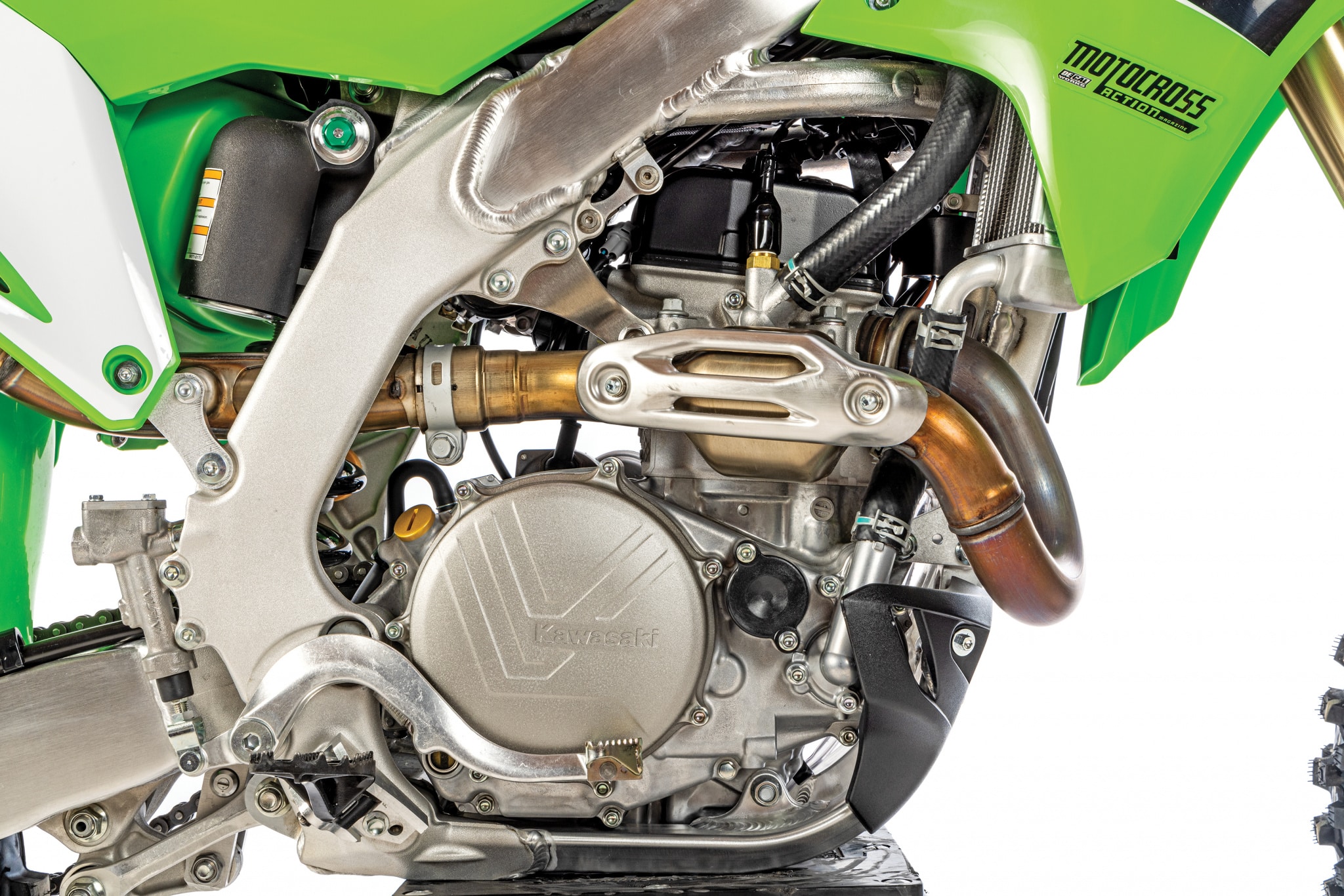 The 2023 KX450 engine has a clean-revving power delivery that isn’t over-powering, but it is supremely manageable.
The 2023 KX450 engine has a clean-revving power delivery that isn’t over-powering, but it is supremely manageable.
Q: HOW DOES THE 2023 KAWASAKI KX450 RUN ON THE TRACK?
A: The 2023 KX450 powerplant delivers a nice, pleasant, brisk, non-confrontational style of power that is popular with the MXA test crew. It offers a light-feeling and quick-revving throttle response. In real dirt, the KX450 produces a nice spread of power that jumps from the low-end to the midrange to the top-end with little or no hesitation. It delivers the proper amount of power for the situation at hand. The delivery is extremely usable.
There are, however, some issues with the 2023 KX450’s power.
First, throttle response at low rpm is jerky. The engine has a weird hit when the throttle is first turned.
Second, the Kawasaki KX450 engine isn’t very powerful. Luckily, the lower power delivery allows the rider to ride harder, go in deeper and get on the throttle sooner.
Third, as much as MXA test riders like the 2023 KX450 engine, it makes less horsepower than almost any other 2023 450 motocross bike (save for the RM-Z450). The KX450 peaks at 56.9 horses at 9500 rpm. That doesn’t sound too bad, but the YZ450F, FC450, 450SXF and CRF450 are closer to 60 peak horsepower.
Fourth, in motion, the KX450’s best power is from 6000 rpm to 9000 rpm, but from 9500 rpm and up, the powerband could use some help.
Q: HOW DOES THE 2023 SHOWA SUSPENSION PERFORM?
A: The 49mm Showa forks are too soft. Why wouldn’t they be? They were too soft in 2020, too soft in 2021, too soft in 2022 and remain unchanged for 2023. The 49mm Showa coil spring forks on the KX450 are the same basic units that are found on the Suzuki RM-Z450 and Honda CRF450 but with different valving. As they roll off the showroom floor, they are plush, comfortable and follow the ground well; however, they are too plush, too comfortable and follow the ground too well to work for anyone but a lightweight Novice, comfort-seeking Vet or play-riding slow-poke. No MXA test rider, from fast Vet to quick Intermediate to AMA Pro, could race with these forks in their stock setup. They bottom hard and bounce off the ground on rebound.
In short, the slower the test rider, the more he liked the KX450 forks. Conversely, the faster the test rider, the less he liked the KX450 forks. Novices and Vets loved the plushness so much that they didn’t mind the occasional clank.
Q: HOW DOES THE 2023 KAWASAKI KX450 HANDLE?
A: Face it, with forks this soft, the 2023 Kawasaki KX450 is only going to feel good when there are no big jumps, big bumps or big downhills on the track; however, once you get the forks stiffened up, by either the low-cost method of adding stiffer fork springs or the high-end solution of sending the forks out to your favorite suspension guru, the KX450 chassis can come into its own. Like most modern motocross bikes, the KX450 works best when the front and rear suspension are balanced and the chassis is flat and level.
Of all the aluminum-framed motocross bikes, the Kawasaki chassis is the most forgiving. It is not as supple as the chromoly steel frames on the Austrian machines, but it is light years more absorbent than the rigid Suzuki, Honda and Yamaha frames. It has a nimble feel and is easy to move around on the track.
Q: HOW DO YOU MAKE THE 2023 KX450 BETTER?
A: To build a better 2023 Kawasaki KX450, all the engineers at the factory have to do is follow the breadcrumbs left by the limited-edition Kawasaki KX450SR Special Racer with an understanding that they would have to duplicate the KX450SR mods on a budget, because a stock 2023 KX450 retails for $9599 and the 2022 KX450SR had a $12,400 sticker price.
Here is how the KX450 could be better.
Engine. Every MXA test rider loved the KX450SR powerband. They raved about how smooth it was off the bottom, how linear it was through the middle and how fast it was on top. It had seamless power that you don’t find on many bikes, even if that is what every R&D department is aiming for. As a test, we took the black box off the KX450SR and put it on a stock KX450. It was night and day faster. Then, we took the Pro Circuit Ti-6 pipe off the KX450SR and put it on the stock KX450. Suddenly, we were pushing 60 horses. We could have, but didn’t, port the stock KX450 intake to match that of the KX450SR because we were happy with just the SR ECU and SR pipe (plus, we could get Twisted Development to remap the stock black box to run just like the KX450SR ignition at a much lower cost, and we could order a Pro Circuit T6 exhaust system and save $300 over the SR’s Ti-6).
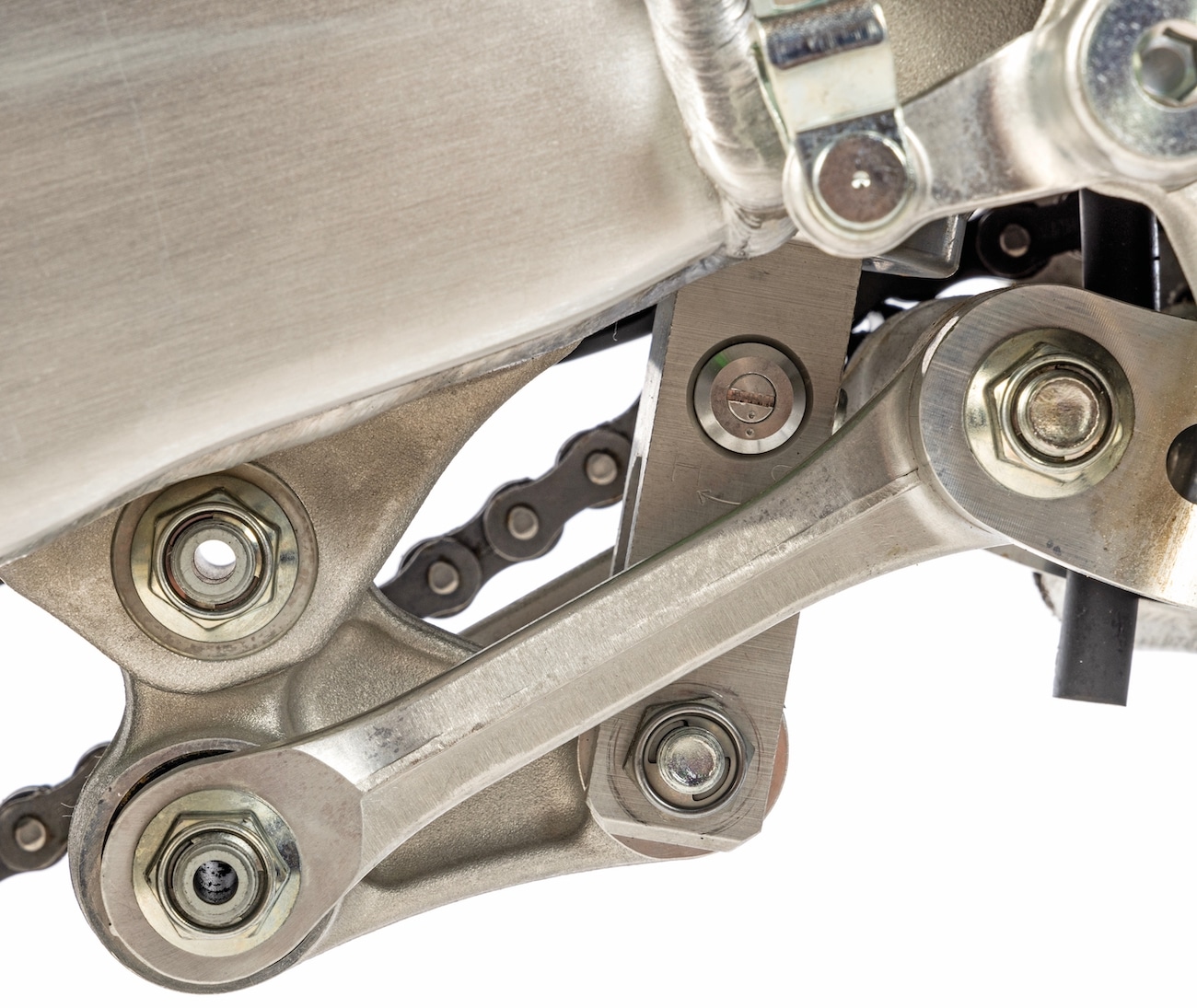 Suspension. The KX450SR was spec’ed with Kayaba suspension instead of the stock Showa KX450 components, but expensive suspension parts are only as good as the valving in them. Great forks with bad valving are bad forks. The stock 49mm Showa fork and shock can be great for the cost of sending them out to be re-valved. The cheapest quick fix is to put a 0.52 fork spring in one leg to stiffen them up and select the correct shock spring for each rider’s weight.
Suspension. The KX450SR was spec’ed with Kayaba suspension instead of the stock Showa KX450 components, but expensive suspension parts are only as good as the valving in them. Great forks with bad valving are bad forks. The stock 49mm Showa fork and shock can be great for the cost of sending them out to be re-valved. The cheapest quick fix is to put a 0.52 fork spring in one leg to stiffen them up and select the correct shock spring for each rider’s weight.
Wheels. The expensive KX450SR is touted as coming with D.I.D. DirtStar ST-X rims as an upgrade, but a quick check of the serial numbers on the stock KX450 rims reveals that the only difference between the two rims is that the KX450SR rims are imprinted with white D.I.D. DirtStar STX logos.
Needless foof’. Do you really want the ugly monster-claw graphics from the KX450SR on your bike? Why have a Hinson clutch cover when nothing inside the engine is made by Hinson? Does the gold D.I.D chain float your boat?
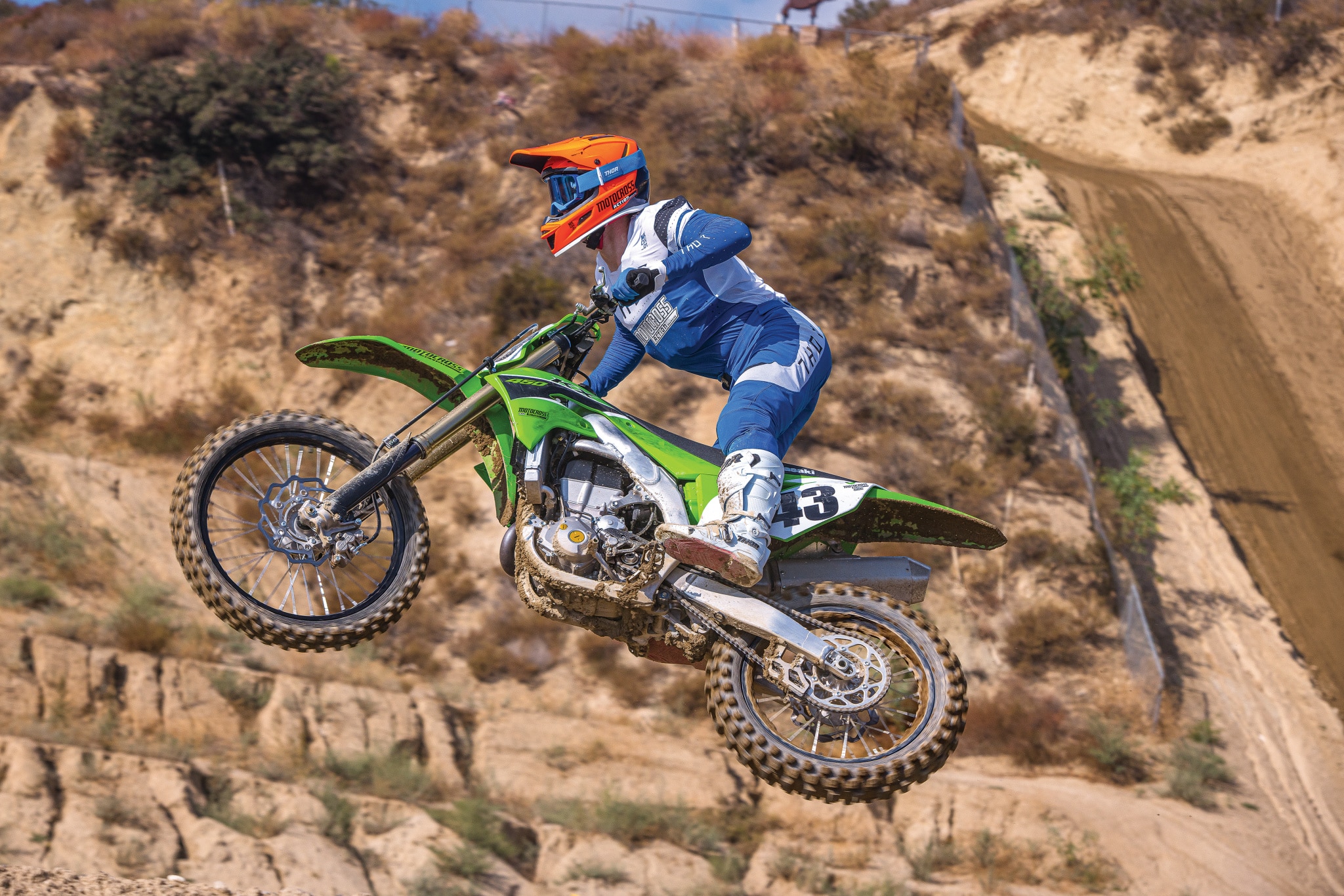 We had hoped that the 2023 KX450 would get some of the good stuff from the 2022 KX450 Special Racer.
We had hoped that the 2023 KX450 would get some of the good stuff from the 2022 KX450 Special Racer.
Q: WHAT DID WE HATE?
A: The hate list:
(1) Nitpicking. When you live with a production KX450 for any length of time, you notice that the flaws that were on the 2019 KX450 are still present four model years later.
(2) Radiator cap. Do the Kawasaki engineers not know that the engine overheats easily? We run a 2.0 kg/cm2 Twin Air Ice Flow radiator cap.
(3) Fork guards. Do the engineers turn a blind eye to how easy it is to shatter the front fork guards? We broke one of our Kawasaki KX450 fork guards in the first hour of riding.
(4) Couplers. Do we really want to fiddle with green, white and black couplers when we can change maps on the blue, orange, white and red bikes with the push of a button?
(5) Brake. What’s with the touchy, feely, grabby, squeaky 250mm rear rotor? Would it kill Kawasaki to mount the 240mm rotor from the KX250 or the KX450X on the KX450?
(6) Bar mounts. How long do we have to wait for Kawasaki to replace the marshmallow-like, rubber, bar-mount inserts that twist in the most minor crashes?
(7) Durability. The exploding chain roller, splintering fork guards, stripped bolts and marshmallow bar mounts portend trouble ahead.
Q: WHAT DID WE LIKE?
A: The like list:
(1) Power. This is an incredibly nice powerband. It is the uniqueness of the KX450 powerband that makes it nimble, quick and such a joy to ride. Mess with it at your own risk.
(2) Handling. Once you stop the forks from blowing through the mid-stroke, the KX450 is a sweet-turning machine.
(3) Footpegs. The KX450 footpegs can be moved down 5mm if you so desire.
(4) Weight. The 2023 Kawasaki KX450 is in the running for the lightest Japanese-made motocross bike at 234 pounds.
(5) Bar mounts. The rubber dampers need to be firmer, but the bars can be adjusted to four different locations. They come stock in the front holes with the bar mounts swiveled rearward, but most MXA test riders run the bar mounts in the rearward holes with the bars swiveled forward.
Q: WHAT DO WE REALLY THINK?
A: The 2023 Kawasaki KX450 is a nice, pleasant, fun race bike, but by no stretch of the imagination is this the best 450 motocross bike of 2023. And we are pretty safe in that assumption because it wasn’t the best 450 in 2019, 2020, 2021 or 2022—and it is unchanged for 2023.
However, the Kawasaki could be the 450 of the year in the future if the engineers spec’ed a smaller rear rotor and offered KX450SR mapping, improved durability, a longer-lasting chain roller, higher-pressure radiator cap, better plastic, re-valved forks and an improved airbox design.
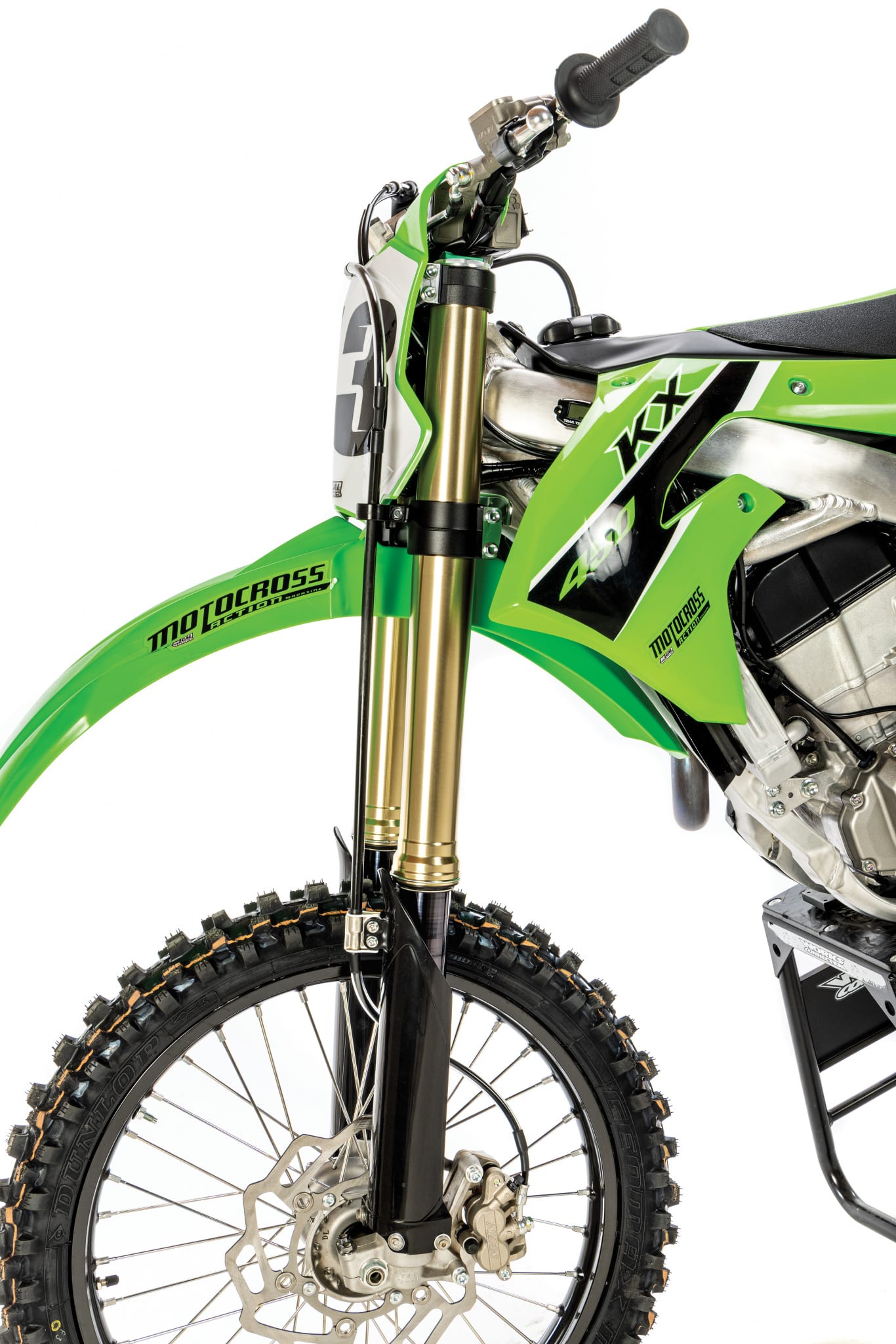 Most MXA test riders wanted to stiffen up the 49mm Showa forks because they were too soft in 2020, 2021, 2022 and now 2023.
Most MXA test riders wanted to stiffen up the 49mm Showa forks because they were too soft in 2020, 2021, 2022 and now 2023.
MXA’S 2023 KAWASAKI KX450 SETUP SPECS:
This is how we set up our 2023 Kawasaki KX450 for racing. We offer it as a guide to help you find your own sweet spot.
SHOWA COIL-SPRING FORK SETTINGS
The 2023 KX450 Showa forks are too soft. Kawasaki’s stock spring rate is 5.0 N/mm. It works for lightweight riders, Vet Novices and tracks without big jumps, but for faster or larger riders there are three simple solutions. First, we suggest that Vet riders run a stock 5.0 spring in the right fork leg and Kawasaki’s optional 5.2 N/mm spring in the left fork leg. That adds up to a stiffer 5.1 N/mm spring rate. Second, faster or heavier riders can opt for Kawasaki’s optional 5.2 N/mm fork springs in both fork legs. Third, in truth, these forks could use a re-valve, because the stock springs would be sufficient if the KX450 forks had adequate compression damping. These are the numbers we ran on the 2023 Kawasaki KX450 for hardcore racing:
Spring rate: 5.1 N/mm (5.0 N/mm for light riders, 5.1 N/mm for Vet riders, 5.2 N/mm for fast riders)
Compression: 12 clicks out
Rebound: 12 clicks out
Fork-leg height: 2mm up (0mm)
Notes: If you have to race with the stock fork springs while waiting to get your forks fixed, slide the forks down in the clamps until the top of the triple clamp is even with the bottom of the fork cap. Be forewarned that you cannot fix the softness of the KX450 forks by going in on the compression clickers—that just introduces harshness at the end of the stroke. If you don’t think the KX450 is turning as well as it should, slide the forks up in the triple clamps to put more weight on the front wheel and steepen the head angle.
SHOWA SHOCK SETTINGS
The shock worked well from day one. We recommend this shock setup on the 2023 Kawasaki KX450 (stock specs are in parentheses):
Spring rate: 54 N/mm
Hi-compression: 1-1/4 turns out
Lo-compression: 18 clicks out
Rebound: 12 clicks out
Race sag: 105mm
Notes: The shock was easy as pie to set up. The rear end had minimal wallowing and worked very well under braking in chop and square-edged bumps. Lighter riders under 150 pounds might want to switch to the optional 52 N/m shock spring, while faster or heavier riders will need the 56 N/mm spring.


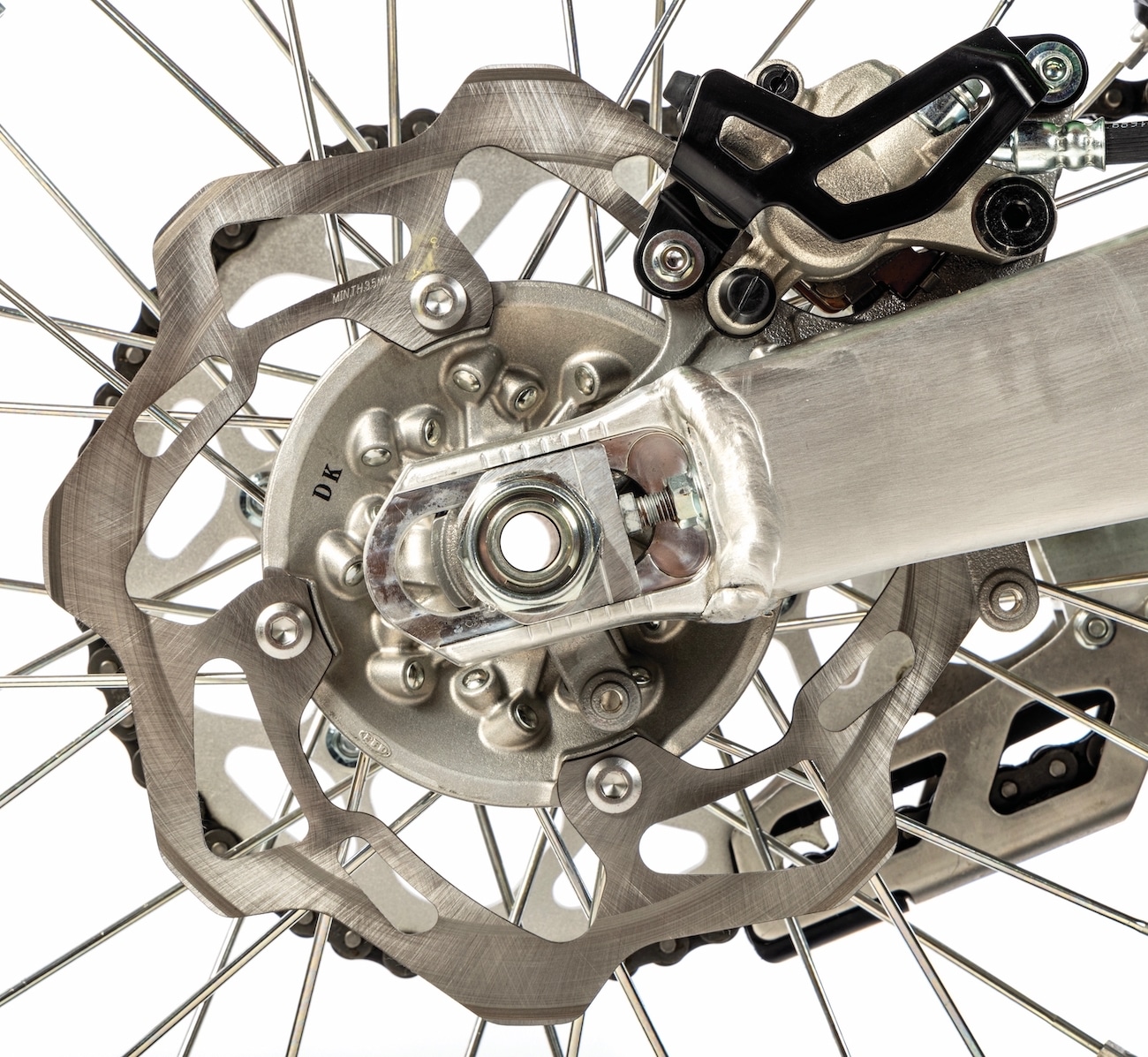
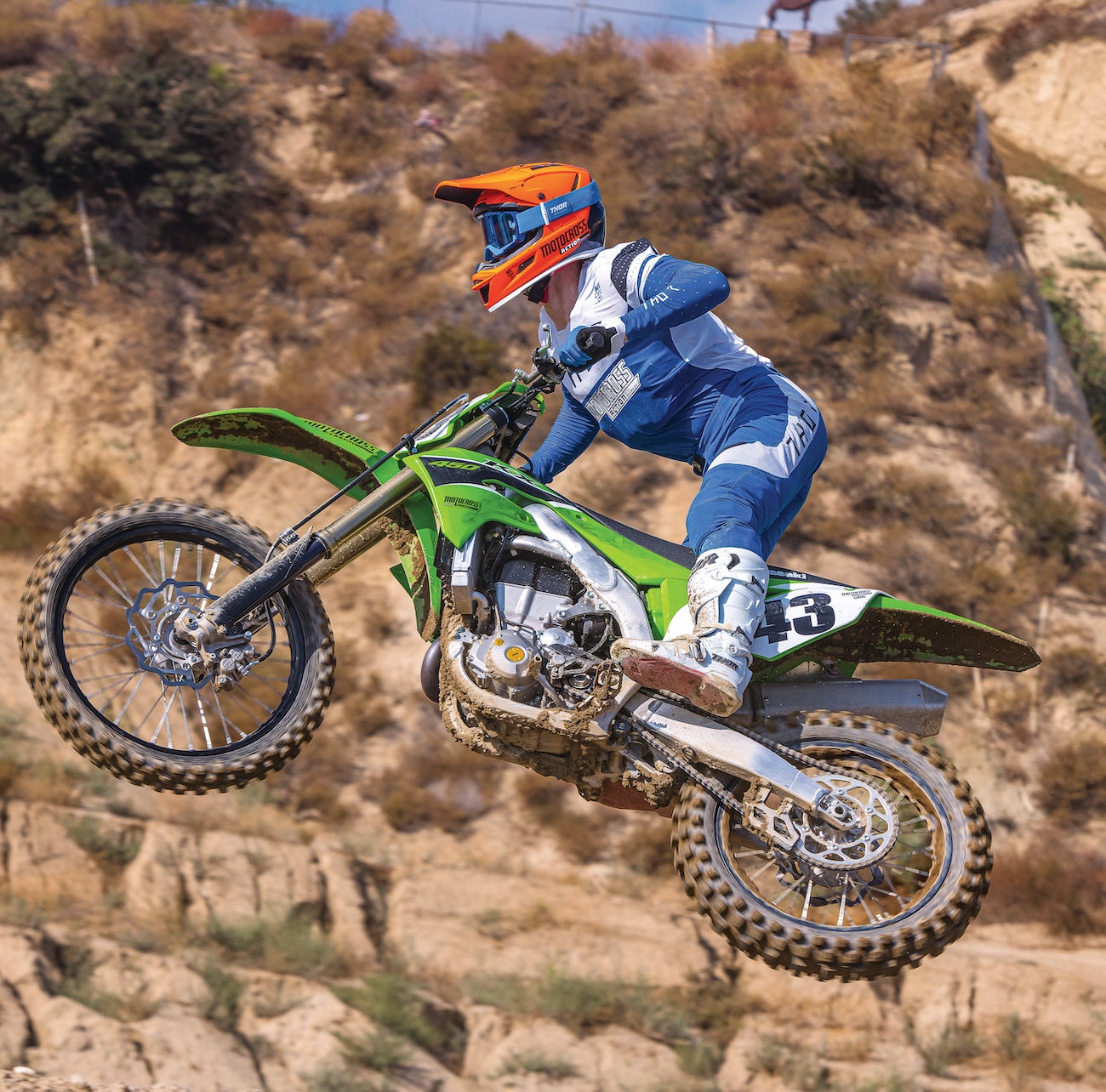
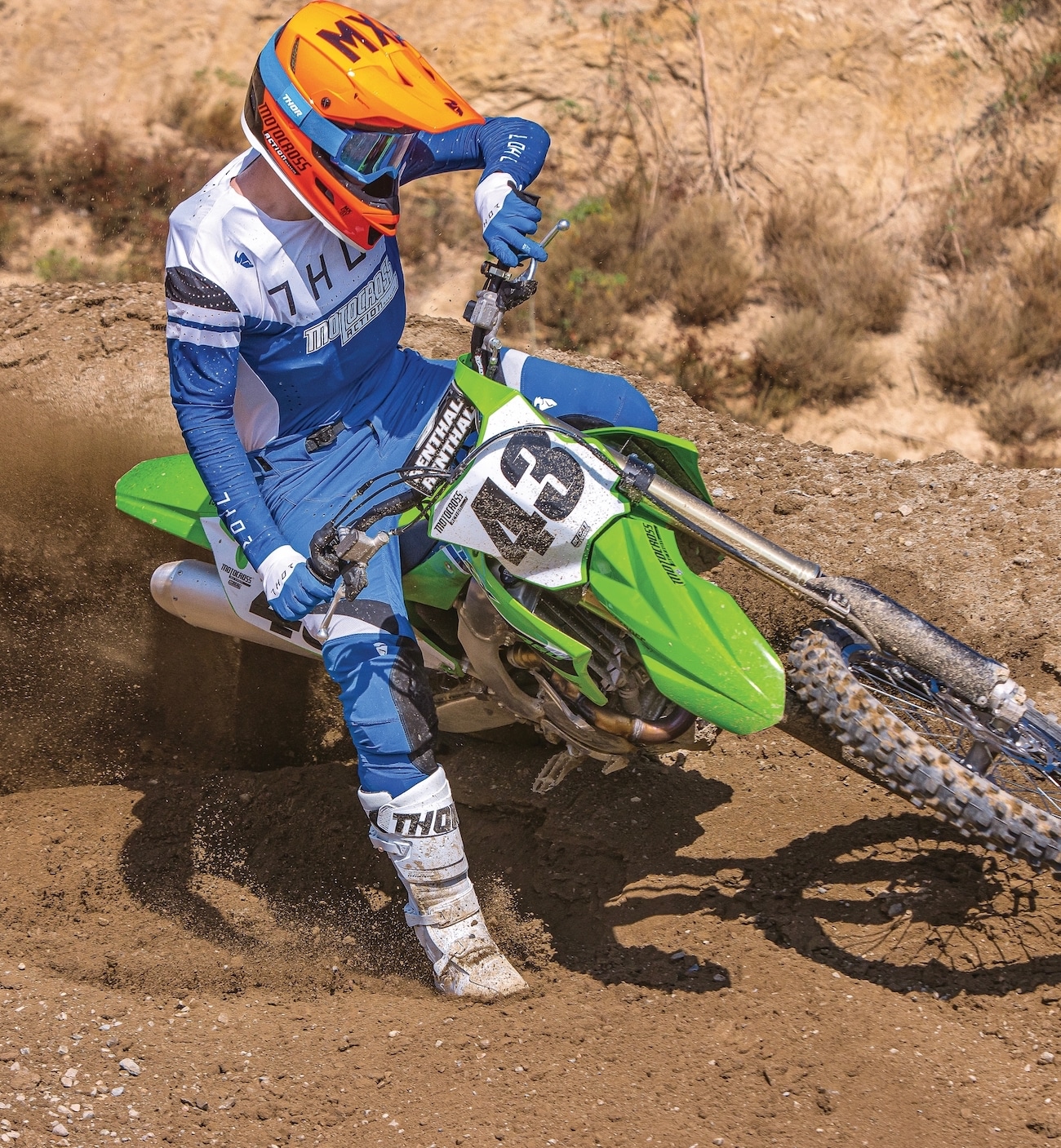

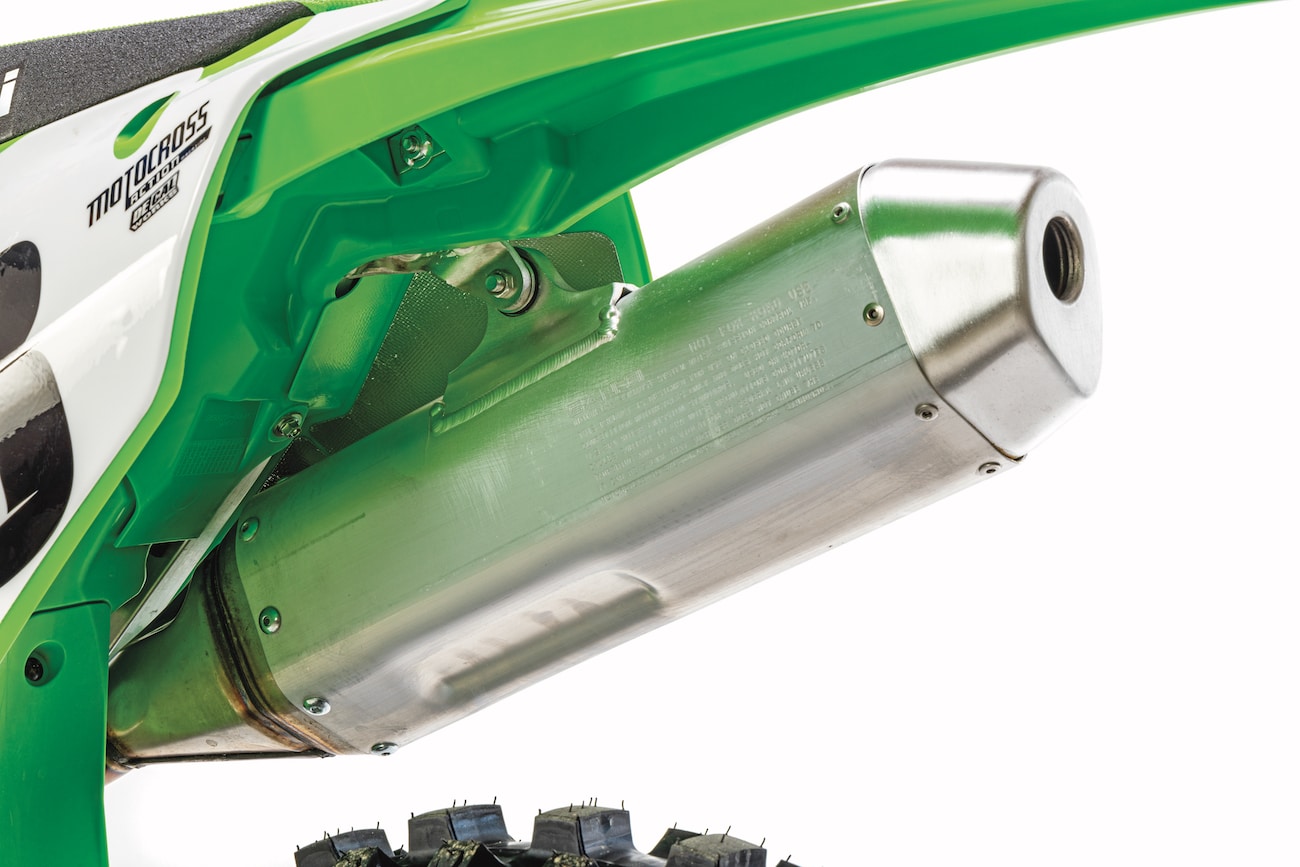
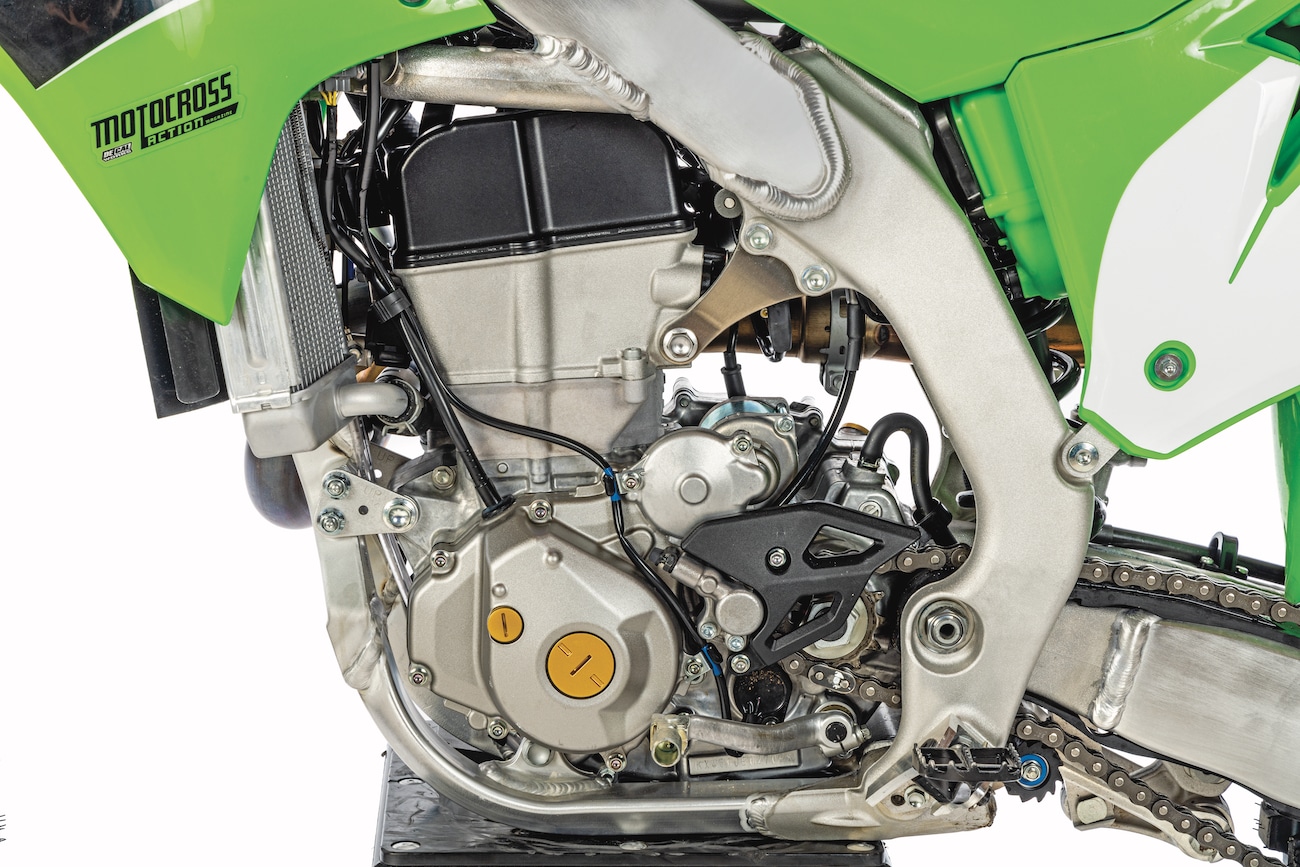
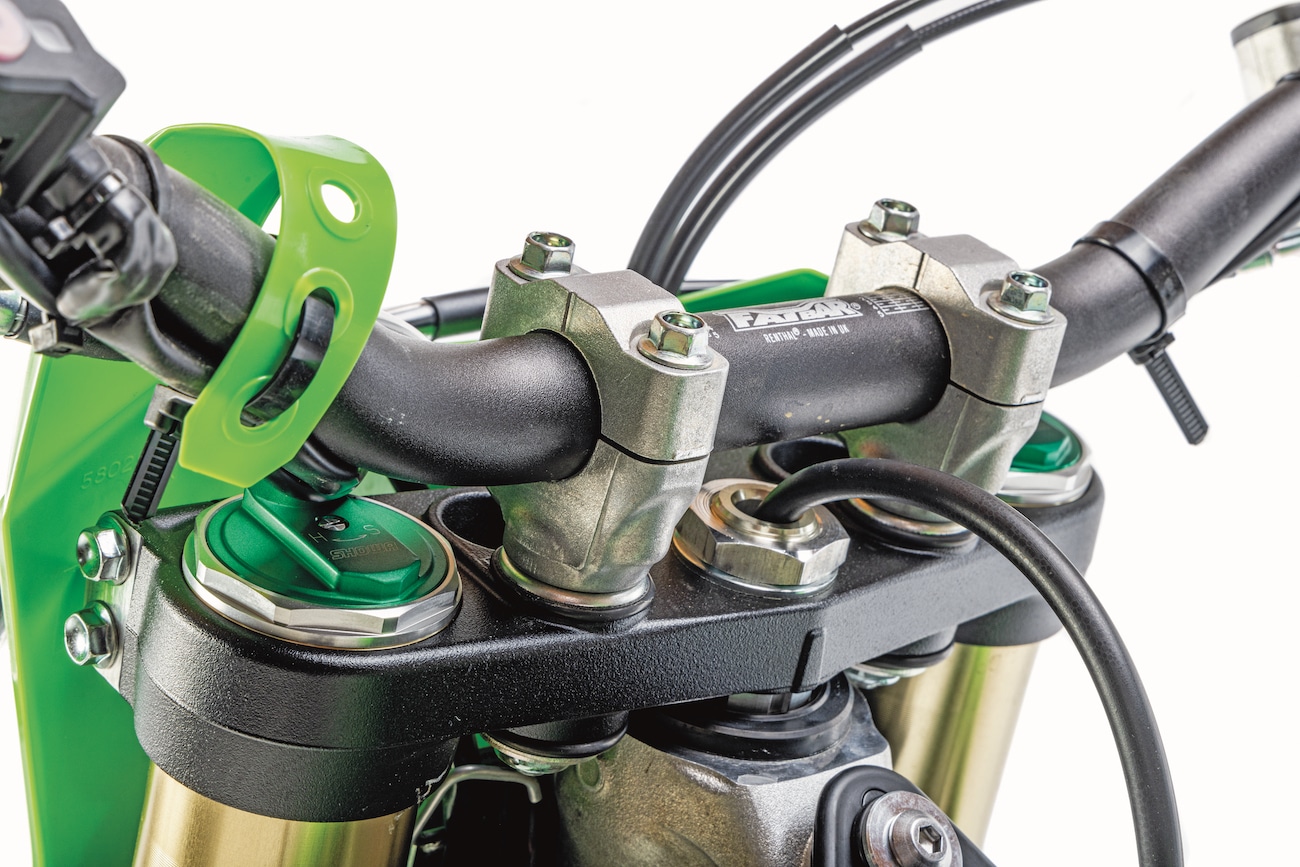
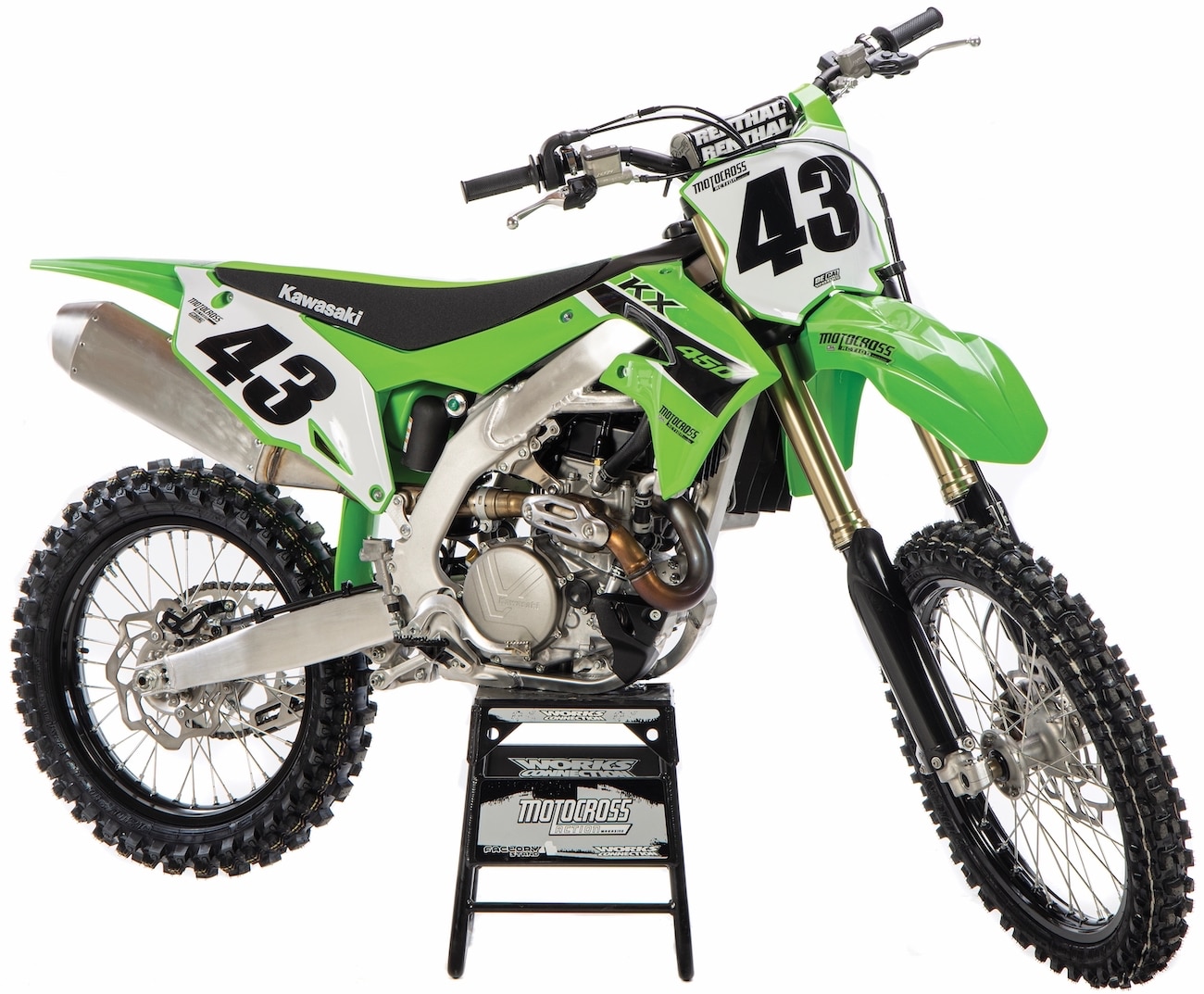
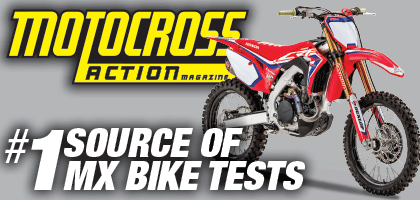


Comments are closed.